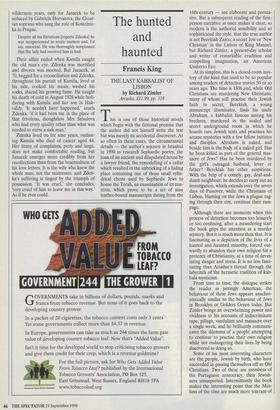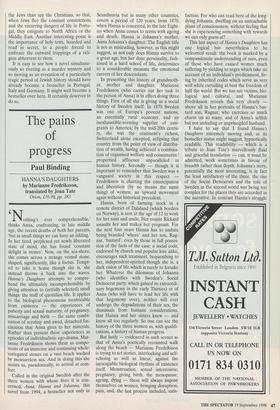The hunted and haunted
Francis King
THE LAST KABBALIST OF LISBON by Richard Zimler Arcadia, £11.99, pp. 318 This is one of those historical novels which begin with the fictional premise that the author did not himself write the text but was merely its accidental discoverer. As so often in these cases, the circumstantial details — the author's sojourn in Istanbul in 1990 to research Sephardic poetry, the loan of an ancient and dilapidated house by a lawyer friend, the remodelling of a cellar which resulted in the unbricking of a hiding place containing one of those small cylin- drical chests used by Sephardic Jews to house the Torah, an examination of its con- tents, which prove to be a set of nine leather-bound manuscripts dating from the 16th century — are elaborate and persua- sive. But a subsequent reading of the first- person narrative at once makes it clear, so modern is the authorial sensibility and so sophisticated the style, that the true author is not Berekiah Zarco, a secret Jew or 'New Christian' in the Lisbon of King Manuel, but Richard Zimler, a present-day scholar and writer of remarkable erudition and compelling imagination, an American Umberto Eco.
At its simplest, this is a closed-room mys- tery of the kind that used to be so popular among readers of detective stories 50 or so years ago. The time is 1506 and, while Old Christians are murdering New Christians, many of whom still practise their Jewish faith in secret, Berekiah, a young manuscript illuminator, finds his uncle Abraham, a kabbalist famous among his brethren, murdered in the sealed and secret underground room in which he hoards rare Jewish texts and practises his arcane mysteries with a few fellow initiates and disciples. Abraham is naked, and beside him is the body of a naked girl. Has he been killed as part of the general mas- sacre of Jews? Has he been murdered by the girl's outraged husband, lover or father? Berekiah has other suspicions. With the help of a comely, gay, deaf-and- dumb neighbour, he decides to carry out an investigation, which extends over the seven days of Passover, while the Christians of Lisbon, blaming on the Jews a plague rag- ing through their city, continue their ram- page.
Although there are moments when this process of detection becomes too leisurely or too confusing, after a meandering start the book grips the attention as a murder mystery. But it is much more than that. It is fascinating as a depiction of the lives of a hunted and haunted minority, forced out- wardly to abandon their own religion for a pretence of Christianity, at a time of devas- tating danger and stress. It is no less fasci- nating than Ariadne's thread through the labyrinth of the hermetic tradition of kab- bala mysticism.
From time to time, the dialogue strikes the reader as jarringly American; the behaviour of these Jews appears anachro- nistically similar to the behaviour of Jews in Brooklyn or Golders Green today. But Zimler brings an overwhelming power and vividness to his accounts of indiscriminate rape, pillage, vandalism and massacre over a single week, and he brilliantly communi- cates the dilemma of a people attempting to continue to practise their own religion while not endangering their lives by being discovered as doing so.
Some of his most interesting characters are the people, Jewish by birth, who have succeeded in passing themselves off as Old Christians. Two of these are members of the Portuguese aristocracy, their Jewish- ness unsuspected. Intermittently the book makes the interesting point that the Mus- lims of the time are much more tolerant of the Jews than are the Christians, so that, when Jews flee the constant constrictions and the recurring dangers of life in Portu- gal, they emigrate to North Africa or the Middle East. Another interesting point is the importance of holy texts, hoarded and read in secret, to a people forced to embrace the outward trappings of a reli- gion abhorrent to them.
It is easy to see how a novel simultane- ously so riveting as a murder mystery and so moving as an evocation of a particularly tragic period of Jewish history should have already become a bestseller in Portugal, Italy and Germany. It might well become a bestseller over here. It certainly deserves to do so.











































































 Previous page
Previous page